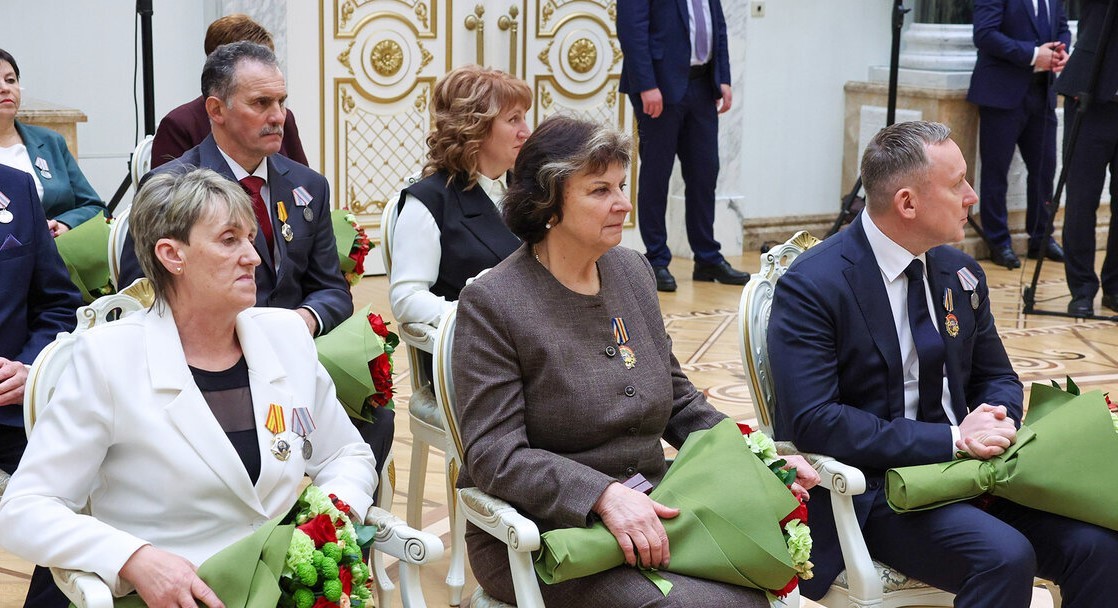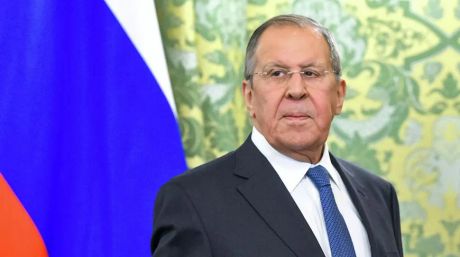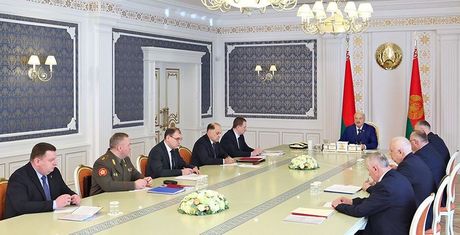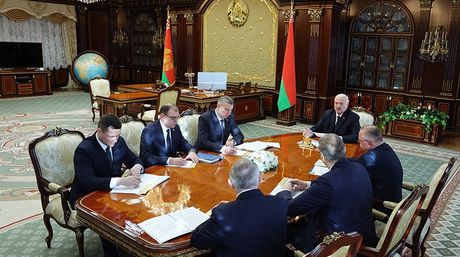Lukashenko presented state awards to the best performers of the agribusiness complex
12:00, 11 November
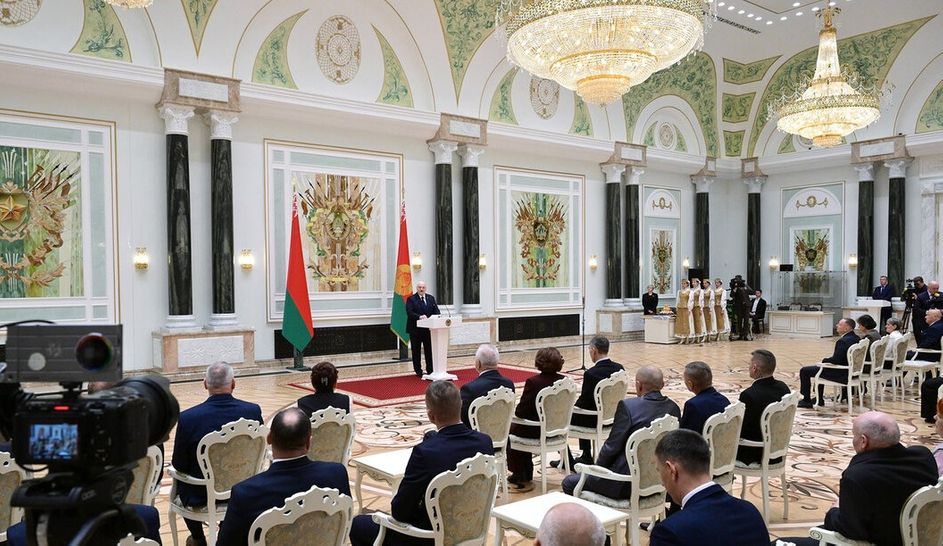
Photo: the press-service of the head of state
Belarusian President Aleksandr Lukashenko presented state awards to the best performers of the agribusiness complex. The solemn ceremony took place in the Palace of Independence on 11 November ahead of Agriculture and Processing Industry Workers’ Day, the press-service of the head of state reports.
- Share on Facebook
- Share on VK
- Share on Twitter
The President started the ceremony by underscoring two key points. These conclusions, he said, will be fundamental in shaping the future course of the country’s agricultural policy.
“First of all, my advice to you, the best farmers, and to those listening: we need to stop whining and complaining that we don’t have enough people in the countryside. We have everything we need, and this year is proof of that. The year has been very difficult. I cannot recall such a challenging period for agriculture and the processing industry as this year,” Aleksandr Lukashenko said. “It was a very difficult year. So what? This year, despite my exacting standards and pickiness (a farmer trait), we all saw (not just me) that you have performed much better than in previous years. Much better, despite everything that was happening around us.”
“It was as if the Lord was testing us to our limits. And yet? We delivered excellent results. We can already state this today. Maybe I am exaggerating. Not excellent, but the best we have ever had. When we are determined, we have enough people, enough machinery, enough discipline, and enough order. I am talking in general.Although, to be specific, as you have heard regarding Vitebsk Oblast and from my trips to the south of Belarus, some things are unacceptable, extremely negative,” the head of state noted.
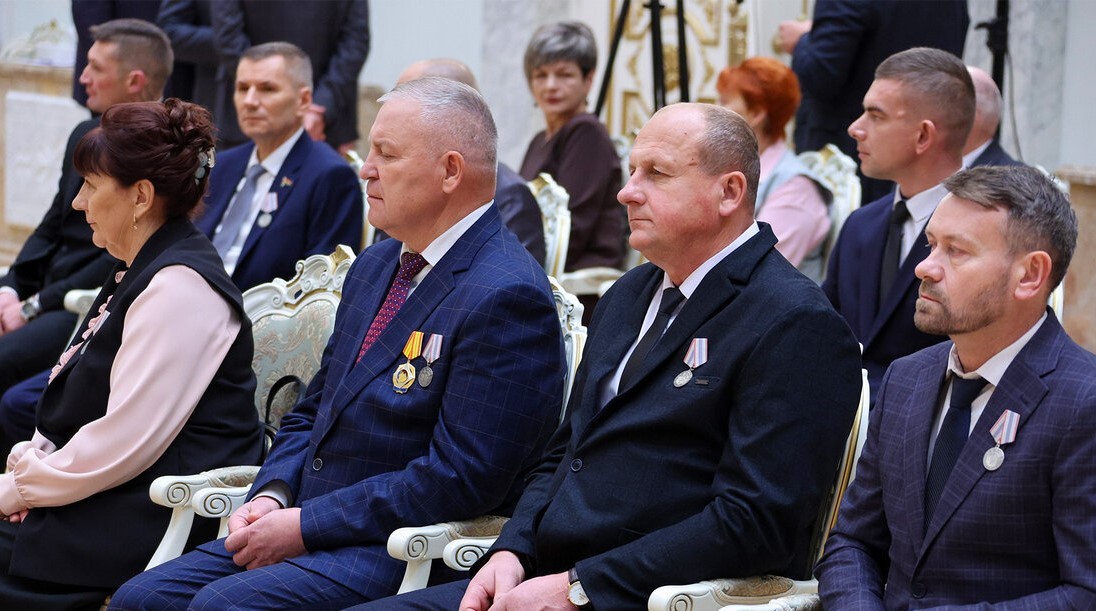
Aleksandr Lukashenko stressed that “if we set our minds to it, we can do anything.”“Therefore, we must stop complaining about having many problems in agriculture. We must be prepared for this every day. So, let’s stop complaining and start working,” the Belarusian leader urged.
The second point made by the President stems from the first. The performance in the current year is traditionally assessed against the previous year’s indicators. Aleksandr Lukashenko suggested that the agricultural sector should abandon this practice from now on and evaluate the results of a particular year using the 2025 level as a benchmark. “This is a task for our agricultural sector leaders and our economists. The indicators of this year should become the criterion for evaluating future periods. It will be important for me to see that you have reached the level of this year’s indicators. Because it was the best in these parameters,” the President instructed. “Most importantly, we achieved these results not in theory, but in practice. So why shouldn’t we compare with this year? Therefore, since we have reached this peak level, we will henceforth compare and evaluate ourselves, and above all agriculture, against the level of this year.”
The head of state emphasized that this year’s harvest, coupled with abundant high‑quality raw materials, has boosted processing and expanded production, yielding natural, high‑quality, and tasty Belarusian foods now enjoyed in 113 countries worldwide.
“By the end of 2025, we expect record high revenues of more than $9 billion from food and agricultural raw material exports,” the President said.
However, this is far from the limit, and Aleksandr Lukashenko expressed confidence that volumes can and should be higher. “Our task next year is to reach $9.5 billion,” the head of state emphasized. “And by the end of the new five‑year plan, we will aim for $12 billion.”
He stressed that this goal must be pursued under challenging conditions, including continued sanctions pressure, which remains a factor of competition. “Thank God I have succeeded in shifting your focus away from constant complaints about sanctions. Yes, they exist, but the most important thing is competition. We cannot escape it. Even if we seek agreements with neighbors or major global players, we will still be under pressure,” the President pointed out. “Why? Because we rely on ourselves and continue to achieve more. And that is competition on the global markets.”
He cited Ukraine’s efforts to ship grain via Poland to other markets as an example. Poland, which publicly supports Ukraine, strongly opposed this in practice. “When Ukrainians attempted last year and again this year to transport grain through Poland to ports such as Gdańsk, since not all shipments could leave via Odesa due to the war, the result was clear: Poland blocked the border and refused passage. Even the simple transit of grain to port for onward delivery to Africa or other markets was denied. This is competition, and this is what it looks like in practice,” Aleksandr Lukashenko stressed.
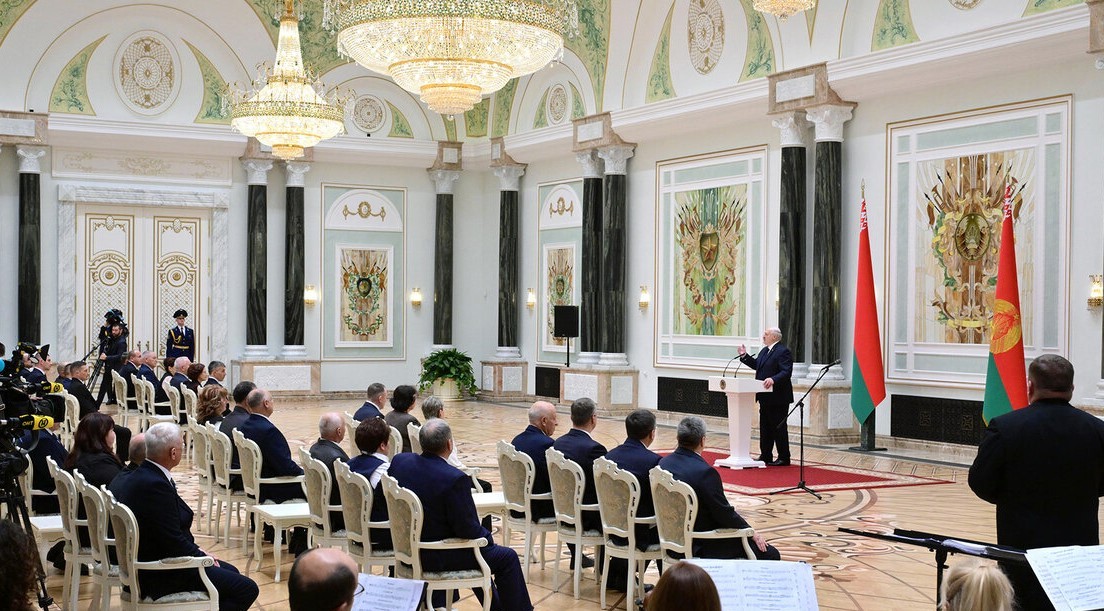
“That is why we have faced and will continue to face pressure, until we collapse, until we become like our Baltic neighbors, until our economy is dismantled. Only then will we be treated as friends, because we will be just another market, buying and consuming for ourselves, and serving as a transit hub for Russia and beyond. They will export everything: harvesters, tractors – products we already manufacture… They already produce all of this. What they need is a market,” the President said.
“Competition is not a bad thing, but when it comes with a gun in hand, that is bad,” he added.
The head of state underlined that under such conditions Belarusians will have to work harder, devepol new varieties and crops, advance technologies, seek opportunities, and more actively enter markets. “Especially now, when food, clothing, and even armaments are in demand,” the President stated.
“The words ‘bread’ and ‘life’ can safely be equated. Therefore, Belarusians have always considered, and continue to consider, the hard work of peasants the most important and sacred on earth,” the head of state emphasized.
The President noted that over the years of independence, Belarus has succeeded in creating a powerful and highly efficient agro-industrial complex. Today, 212,000 agricultural machines – mostly domestically produced – are in operation in the fields, and nearly 3,000 farms produce milk. The country now boasts 38 large poultry farms, 18 fish farms, 94 pig farms, and 64 large beef production facilities. Furthermore, Belarus mines potash, produces complex fertilizers, and develops veterinary medications, compound feed, and premixes. “But there is still room for improvement,” the Belarusian leader noted.
For the 2025 season, the head of state projected a harvest of grain and legumes to exceed 11 million tonnes, including rapeseed and corn in bunker weight.
“But, as the saying goes, we need not only bread, but also something to go with it,” the President noted. Given the country’s stockpiles of food and feed grains, as well as grass feed, he also projected strong results in livestock farming.
By the end of the year, Belarus is projected to produce over 9 million tonnes of milk. “That’s almost 1,000 liters per capita (958 liters in 2024). A colossal figure,” Aleksandr Lukashenko emphasized. Approximately 70 farms are expected to exceed a dairy herd productivity of 10,000 kg per cow, with five farms yielding over 13,000 kg per head. “This means new dairy peaks lie ahead. Our meat and poultry production is also on the rise,” the head of state added.
In addition, the harvest has yielded more than 5 million tonnes of sugar beets, around 900,000 tonnes of potatoes, and about 600,000 tonnes of vegetables. “The government promises that we will be able to make cabbage soup and borscht from inexpensive and delicious Belarusian beetroots, onions and cabbage. There should be enough for everyone – and there has been for a long time; we just need to manage it properly,” said Aleksandr Lukashenko.
He noted that this year's entire harvest was grown and gathered under extremely challenging weather conditions. “We persevered,” the Belarusian leader stressed. “We fought shoulder to shoulder in this battle for the harvest: we sent combined teams from neighboring regions to the fields, and brought in the military, Emergencies Ministry personnel, and all concerned citizens.” The President recalled that, at his direction, employees from various organizations and enterprises will be recruited to operate expensive domestic equipment during the peak agricultural season.
The President recognized the achievements of record-breaking farms with yields exceeding 100 centners per hectare, as well as 25 districts that achieved a gross grain harvest of over 100,000 tonnes. More than 3,100 combine crews each threshed over 1,000 tonnes of grain. “There were also true champions. On the national podium was one ‘gold’ crew, having threshed over 8,000 tonnes – I remember when I worked [in agriculture], 4,000 tonnes on a farm was a dream, but here one person threshed two harvests of a large farm I once managed. We had seven silver medalists with results exceeding 5,000 tonnes, and nine bronze medalists, with over 4,000 tonnes in their bins,” said Aleksandr Lukashenko.
Speaking about this year's harvest of various crops in the country, the head of state noted that private farms have been reaching leading positions, especially in terms of vegetables, potatoes, fruits, and berries, for more than a year now.
“Therefore, I want to remind the district and regional authorities that in agriculture everyone is playing on the same field and it is important to support good producers, regardless of whether they are a private farmer or a state-owned enterprise," Aleksandr Lukashenko emphasized.
To honor outstanding agrarians is a tradition of many years that began at the dawn of the country’s independence, the head of state said.
The President congratulated everyone on the upcoming professional holiday and wished them new labor accomplishments: high milk yields and weight gains, bountiful crops. As the most important thing he wished them good health and good mood in their families, so that the people would have a place to return to with pleasure after a hard day at work. “We know how to work. The rest is in our hands. If we are healthy, we will accomplish everything. And may you always have good weather in your homes and beyond. I wish you patience. May you give birth to children as a new generation of Belarusian rural dwellers, Belarusian agrarians,” Aleksandr Lukashenko said.
In his opinion, work in agriculture, on the native soil is the most valuable and interesting one. The head of state recalls with fondness the time when he worked and lived in the countryside. “Don’t be so keen to go to cities,” the President offered advice. “Appreciate this time and remember as peasants that they don’t need us anywhere else.”
“In this day and age if you achieve success with your own efforts, then the god will help you. And you will definitely obtain what you want,” Aleksandr Lukashenko went on saying. “If you stop trying, you will not achieve anything in this life. You will keep walking and moaning that the authorities have not sown your vegetables, have not mowed your lawn, have not removed the shrubs, have not made firewood… You will keep walking and moaning.”
The President stressed that certainly, Belarus is a people-first state but it does not mean that support will be granted to just anyone. “We will not help everyone and we should not help because it encourages sponging,” Aleksandr Lukashenko explained. It is necessary to follow the example of primarily the people like those, who attended the state award ceremony.
“Know this: the country is proud of you and I am above all,” the head of state told those present. “You see how much attention I pay to the countryside, to agriculture. And I am proud of your response to these efforts. I can say in any city that you are great people, that you are heroes and that we divert so much attention and spend considerable resources to make sure you stay like that.”
In conclusion of the ceremony on behalf of Belarus’ cereal farmers Agriculture and Food Minister Yuri Gorlov presented a round loaf of bread from this year’s harvest to the head of state as a symbol of food security.
On behalf of all the agricultural workers the minister thanked the President for the trust, support, and an invaluable contribution to the development of the economy branch. “The year 2025 has indeed been complicated as you’ve correctly noted. This year has been a challenge for our agrarians. But we have endured it and persevered. All of our agricultural workers share your belief that it is better to harvest crops that to fight in a war. As they go out into the field every day, as they work at milk-processing enterprises, our people know that our country, our President stand behind them,” Yuri Gorlov stressed.
In turn, Aleksandr Lukashenko once again congratulated everyone on the holiday, wished them good health and success. “The key thing is kids. You must agree that if everything is good with the kids, then it will be good for us as well,” he said.
The awardees included Director General of OAO Agrokombinat Dzerzhinsky Vladimir Lukyanov and Tatyana Struk, Director of OAO Otor in Chechersk District. They were awarded the Order of Labor Glory.
The Order of Honor was bestowed upon Gelena Dremo, an operator of livestock complexes and mechanized farms at the commercial dairy farm Germanishki of the Gudogai agricultural production company in Ostrovets District; Nikolai Kurzenkov, Director of OAO Khotimsk Linen Mill; Galina Legkaya, a machine milking operator at the Rassvet agricultural company named after K.P. Orlovsky in Kirovsk District; Vasily Moroz, a tractor driver-machine operator at the Kokhanovichi agricultural production company in Verkhnedvinsk District; Vladimir Pobegailo, a driver at OAO Put Novy company in Lyakhovichi District.
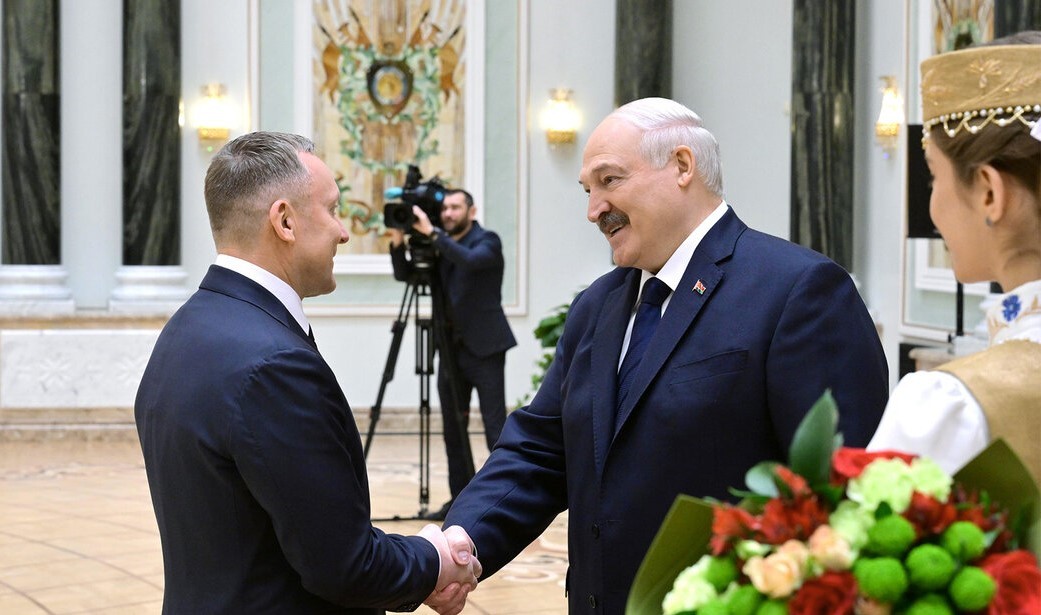
The Honored Worker of Agriculture of the Republic of Belarus title was bestowed upon Ivan Golovenko, chief agronomist of the Progress-Vertilishki agricultural company in Grodno District; Tatyana Dolgonosova, an operator of poultry farms and mechanized farms at Broiler Shop No.1 of ZAO Servolux Agro in Mogilev District; Vladimir Lyubushak, Director of OAO Svyataya Volya in Ivatsevichi District; Andrei Novikov, a tractor driver-machine operator of OAO Tikhinichi in Rogachev District; Vyacheslav Struk, head of the livestock department at the Brilevo agricultural company in Gomel District.
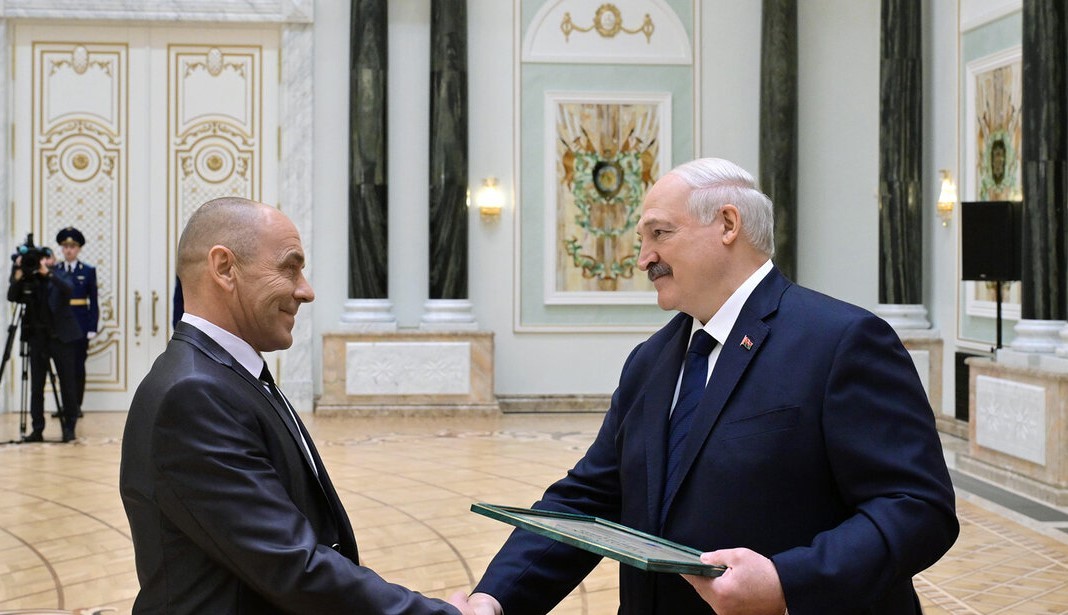
Agribusiness workers were also awarded the Medal for Labor Merits and Presidential commendations.
